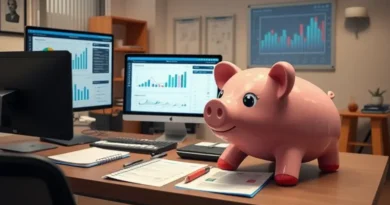How to Separate Personal and Business Expenses Effectively
Managing finances can be one of the trickiest aspects of running a business. While initially, it may seem simpler to combine personal and business expenses, doing so can lead to confusion, mismanagement, and potential legal issues later on. Effectively separating personal and business expenses is crucial for maintaining accurate financial records, which will improve your ability to analyze profitability and make informed financial decisions.
In this post, we will explore the best practices and strategies for segregating personal and business expenses, helping you navigate the waters of finance with ease.
Why It Matters
Separating personal and business expenses has multiple benefits. Firstly, it simplifies your accounting process, allowing for a clearer picture of your business’s financial health. It streamlines tax preparation and can lead to more deductions, as personal expenses are often non-deductible. Furthermore, keeping finances separate guards against the risk of audits, providing a clear line between what belongs to the business versus your personal life.
1. Open a Separate Business Bank Account
The foundation of successfully separating your finances is to open a dedicated business bank account. This allows you to funnel all business income and expenses through a single account. Additionally, a dedicated account provides clear records when tax season rolls around, drastically simplifying your bookkeeping process.
2. Use Accounting Software
Investing in accounting software can be a game-changer for your business. Many programs automatically categorize expenses, making it easier to track where your money goes. Look for solutions that allow you categorization options that align typically with business expenses while keeping your records organized. Popular options include QuickBooks, FreshBooks, and Wave, among others.
3. Maintain a Detailed Expense Report
Another effective strategy is to maintain an expense report detailing all your business expenditures. You can create a spreadsheet or use software to keep track of expenses. Be diligent about logging each expense promptly; this ensures you won’t forget crucial details later on. Include date, amount, purpose, and any relevant receipts.
4. Distinguish Between Shared and Personal Expenses
In many cases, some expenses might overlap between personal and business activities, such as your home internet bill or a personal phone used for business calls. To manage this, clearly distinguish between shared and solely business expenses. Guidelines typically suggest prorating these expenses based on use. For example, if you use your personal phone for business 30% of the time, then 30% of the total phone bill can be classified as a business expense.
5. Utilize Business Credit Cards
Using a business credit card is another successful tactic for separating expenses. By charging only business-related purchases to this card, you can keep a cleaner separation between personal and business finances. Moreover, business credit cards often come with rewards tailored to business needs and can be beneficial in cash flow management.
6. Hire a Professional Accountant
If financial management seems overwhelming or time-consuming, consider hiring a professional accountant. They not only provide expertise but also bring a wealth of experience in expense tracking and tax preparation. An accountant can help you implement effective systems from the start, which is especially crucial for new business owners.
7. Regularly Review Your Financials
It’s essential to regularly review your financial records to ensure that everything is in order. Monthly reviews can help catch misclassified expenses and give you a clearer view of your business’s financial health. Conducting these reviews also prepares you adequately for tax season.
8. Document Everything
No matter how diligent you are, documenting every transaction, receipt, and invoice related to business expenses is crucial. Having organized, comprehensive records will significantly benefit you during audits and for tax deductions.
Conclusion
Separating personal and business expenses is not only a legal requirement but also a strategic advantage for achieving better financial health in your business. By adopting best practices and utilizing tools such as dedicated accounts, accounting software, and professional advice, you can streamline your financial management. This eventually leads to better decision-making, improved profitability, and the overall well-being of your business.




